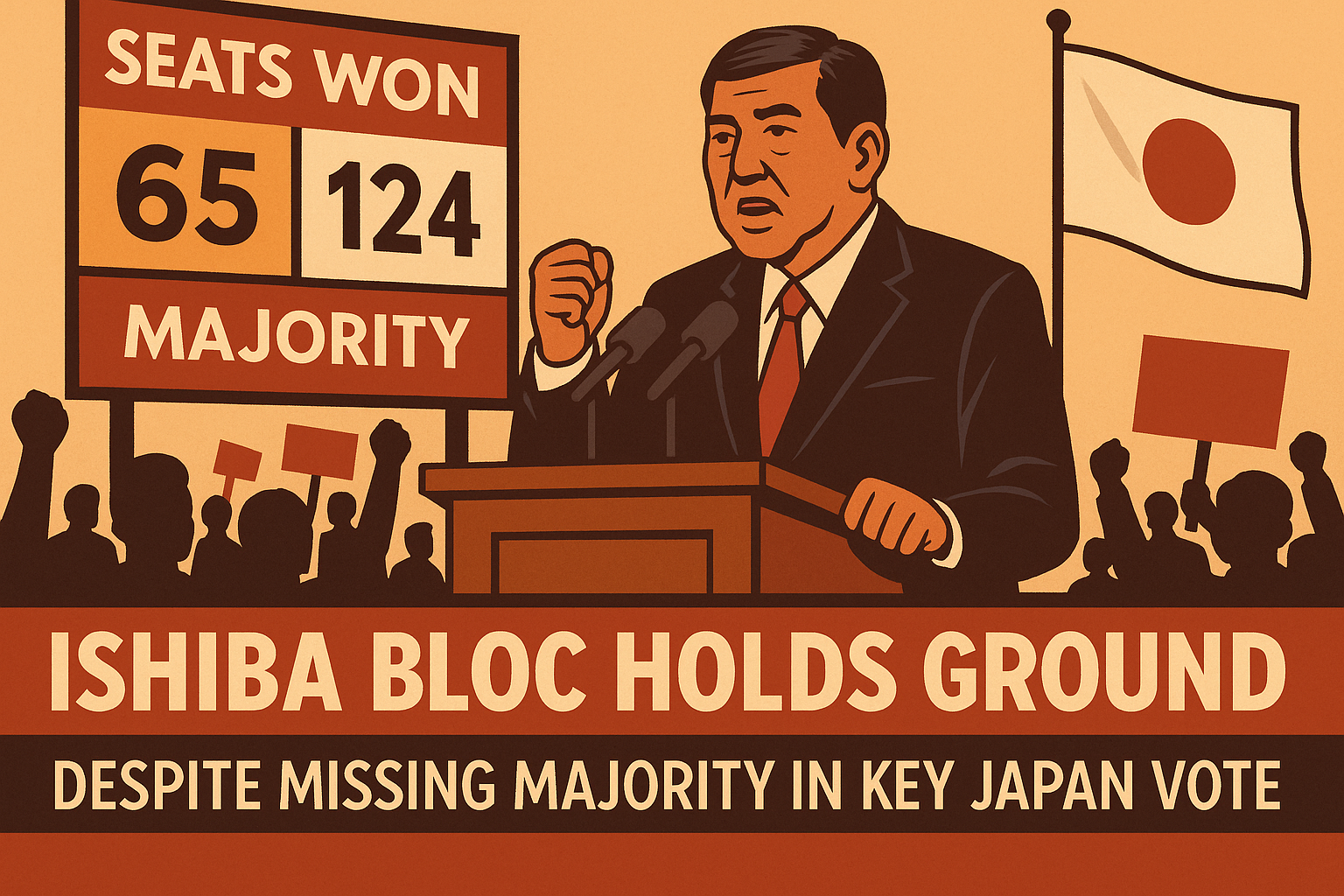Tokyo, Japan — In a pivotal test for Prime Minister Shigeru Ishiba’s leadership, the ruling coalition has lost its majority in Japan’s 248-seat upper house. Yet despite the setback, Ishiba Bloc Holds Ground, emerging as the largest political force and maintaining a strategic foothold in Japan’s deeply divided political landscape.
According to NHK projections, the Liberal Democratic Party (LDP) and its junior partner Komeito fell short of the 50 additional seats needed to retain their majority, ending with 47 wins. The results mark a historic moment—the first time since 1955 that the LDP does not hold a majority in both houses of Japan’s parliament. However, Ishiba Bloc Holds Ground in influence and remains central to future political maneuvering.
Coalition Falls Short, Yet Still Leads
Prime Minister Ishiba had set a modest benchmark—a simple majority of 125 seats across the upper house. Going into the election, the ruling bloc held 75 seats and needed 50 more to stay above the threshold. When the final ballots were tallied, they stood three seats short.
While critics have been quick to frame this as a defeat, political analysts note that Ishiba Bloc Holds Ground in several meaningful ways. The LDP alone won 39 seats—outperforming expectations from exit polls—and retained its position as the largest party in the Diet.
“I take it humbly and sincerely,” Ishiba said during a live NHK interview. “This is a tough situation, but we will continue working for the people.” His remarks struck a tone of resilience, consistent with the narrative that Ishiba Bloc Holds Ground, even under pressure.
Political Fallout and Pressure to Resign
This second consecutive electoral loss—following the lower house defeat last October—has intensified calls for Ishiba to step down. His inability to secure a majority in both chambers has raised concerns about Japan’s political stability.
Still, Ishiba rejected any notion of resigning, stating, “I will fulfill my responsibility as head of the No. 1 party and work for the country.” His refusal to create a power vacuum resonates with supporters who argue that Ishiba Bloc Holds Ground through sheer will and experienced leadership.
Internal party dissent may grow, but as of now, no major figure has stepped forward as an alternative. That vacuum reinforces the idea that Ishiba Bloc Holds Ground, not just in numbers, but as the default governing force in Japanese politics.
Voter Concerns: Inflation, Social Security, and Immigration
The coalition’s underperformance is closely tied to economic anxiety and social challenges. Soaring prices, stagnant wages, and increasing social security burdens have hit households hard. Many voters feel that government measures haven’t reached them quickly enough.
In this context, Ishiba Bloc Holds Ground amid growing disillusionment—not because of blind loyalty, but because of a lack of compelling alternatives. Fractured opposition parties failed to present a united platform, further proving that Ishiba Bloc Holds Ground despite voter fatigue.
Immigration and xenophobic rhetoric became hot-button issues. Emerging populist parties like Sanseito, which campaigned on a “Japanese First” platform, saw notable gains, reflecting public unease. Nevertheless, Ishiba Bloc Holds Ground by avoiding the extremes, promoting stability over reactionary politics.
Trade Friction with the U.S. Adds to Pressure
Prime Minister Ishiba’s handling of U.S. trade tensions has also drawn scrutiny. President Donald Trump criticized the slow pace of negotiations and Japan’s hesitance to import American goods, particularly automobiles and rice.
A proposed 25% tariff, set to take effect on August 1, looms large. However, Ishiba resisted making concessions before the election. With the coalition now in the minority, consensus-building will be harder. Still, Ishiba Bloc Holds Ground, as the most viable bloc to manage delicate foreign relations moving forward.
Populist Surge, but No Unified Opposition
Opposition momentum did materialize—especially for the populist Sanseito and conservative DPP—but the fragmentation undermined their overall impact. The DPP quadrupled its seats from four to 17, and Sanseito surged from one to 14. Yet no single opposition party emerged as a true contender.
The centrist Constitutional Democratic Party of Japan (CDPJ) lagged behind expectations, failing to mobilize widespread support. Its leader, Yoshihiko Noda, called for stronger opposition unity but made no mention of collaborating with the ruling coalition.
Despite the growing opposition presence, Ishiba Bloc Holds Ground due to lack of coordination among rivals. Voters discontent with Ishiba’s performance still opted for the known entity, wary of fragmented ideologies and extreme stances.
Public Reaction: Divided but Cautious
Public sentiment remains split between craving stability and demanding reform. In urban centers like Tokyo, voters expressed concerns about both economic policy and rising xenophobia.
Yuko Tsuji, a 43-year-old consultant, voted LDP for unity. “If the ruling party doesn’t govern properly, the conservative base will drift toward extremes. So I voted with the hope they’d tighten things up.”
Others like Daiichi Nasu, a 57-year-old small business owner, supported the CDPJ. “I want a more inclusive society,” he said. “But I also want competence and clarity. Right now, I’m still not sure anyone else offers that.”
That ambivalence confirms a central theme: even when losing numerical strength, Ishiba Bloc Holds Ground in public perception as the stable choice.
What Lies Ahead?
While the upper house lacks the authority to force a no-confidence vote, the political ramifications of this election are undeniable. Ishiba may be pressured to form new coalitions or renegotiate with existing partners. His leadership faces internal review, but without a clear successor, Ishiba Bloc Holds Ground as Japan’s political anchor.
Legislative agendas on trade, economic stimulus, and social reforms may stall. But observers suggest that Ishiba’s long track record of strategic alliances could come into play. If he can pivot, compromise, and deliver results, the narrative could shift again in his favor.
Conclusion: Stability Amid Uncertainty
In many ways, the results of this upper house election signify a paradox. The coalition technically lost. And yet, Ishiba Bloc Holds Ground in all the ways that matter—by remaining the largest bloc, retaining leadership, and navigating an increasingly volatile political climate.
In a democracy grappling with economic distress, cultural shifts, and global pressure, voters are looking not just for change—but for competent change. While challenges mount, Ishiba Bloc Holds Ground, offering the kind of continuity that a divided electorate may ultimately value.
Whether Ishiba adapts or yields will determine Japan’s path forward. For now, his coalition may not dominate—but it still leads.

Photo By Guohua Song

2 thoughts on “Ishiba Bloc Holds Ground Despite Losing Majority in Japan”
Comments are closed.